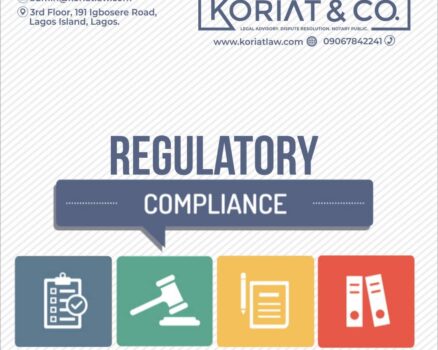
1. Strong Regulatory Supervision Builds up in the Fintech Lending Industry
In November 2021, the Federal Competition and Consumer Protection Commission (“FCCPC”) announced that a Joint Committee was set up by the Federal Government to tackle violation of consumer rights and unfair practices in the money lending industry and that the Joint Committee will shut down illegal businesses at the commencement of its enforcement, making interim regulations and engaging App Stores to shut down certain mobile applications of fintech companies that are “infringing and abusive” in their operations.
The Joint Committee is made up of representatives from FCCPC, the Central Bank of Nigeria (“CBN”), the Economic and Financial Crimes Commission (“EFCC”), National Information Technology Development Agency (“NITDA”) and the National Human Rights Commission (“NHRC”).
It is expected that the Joint Committee will pursue a number of enforcement actions against erring online lenders, who engage in unethical practices in their business operations. We have previously written about the possible changes to expect in the money lending sector in Nigeria from 2022 and so much is happening already.
2. What the Fitech Lenders in Nigeria should expect
There will definitely be series of “market monitoring” orders or directives by the FCCPC, NITDA and other sister agencies to online lenders, especially the defaulting and unethical fintech and lendtech companies offering “Buy Now Pay Later” (“BNPL”) credit and other money lender services. These directives or orders would not only enable the agencies to collect operational information from fintech companies on the risks and benefits of their products and services but may also introduce reporting obligations in respect of this fast-growing industry.
In our experience, any information obtained through regulatory order or directive will help the relevant agencies to better understand how consumers interact with BNPL businesses and other money lender service providers, and how their business models impact the broader e-commerce and consumer credit marketplaces.
The establishment of a Joint Committee of FCCPC, the CBN, the NITDA, the EFCC and the NHRC in the last quarter of 2021 as well as their efforts so far appears to clearly demonstrate the intention and steps to regulate online lenders including BNPL providers very rigorously.
According to the coordinating agency of the Joint Committee, the FCCPC, “We are also going to be writing interim regulations and some basic information for all these money lenders to provide information so that people will know who they are.”
Under Nigerian law, the FCCPC has the authority to issue a notice to online lenders to provide information about their business models and practices and thereafter use the information gathered from this request for any purpose, such as development of enforcement road maps.
It is no gainsaying that conducting routine examinations and supervisions will be one of the key tools of the Joint Committee to ensure that online lenders and BNPL providers comply with Nigerian laws.
3. How BNPL Providers will be Affected
Although there is no specific Nigerian law in existence for licensing and regulation of providers of BNPL products and services across the country, there is currently an initiative by the FCCPC to sign a Memorandum of Understanding (MoU) with the National Insurance Commission (“NAICOM”), the supervisory agency for the insurance sector in Nigeria for the regulation and supervision of BNPL providers.
According to Mr. Babatunde Irukera, the Chief Executive Officer of FCCPC, it is expected that the MoU will be concluded and executed before the 2nd quarter of the year 2022 in order to achieve more industry-wide interventions in the BNPL market space. In his words:
“We get a lot more complaints about the insured who have paid their premium and are not been settled and so, we are engaging NAICOM on that.”
The above clearly shows that not only online money lenders but also the BNPL providers and other providers of consumer financial products or services would be subject of strict regulatory examination and supervision.
4. What the Central Bank of Nigeria is Saying
The CBN is the regulatory agency empowered by the CBN Act and the Banks and Other Financial Institutions Act (“BOFIA”) to license, supervise, regulate, examine and control players in the financial sector. The CBN has been alive to its responsibility to ensure stability of the financial sector and its subsectors by shutting down businesses, blocking bank accounts and arresting persons behind any unlicensed commercial venture carrying on CBN-regulated businesses in Nigeria.
It is however unclear whether the CBN will be stepping in to regulate the online money lenders and BNPL providers, as many, including the House of Representatives, have recently called upon the Apex Bank to develop regulatory guidelines to curb the excessive, abusive and unethical practices of the fintech lenders.
Interestingly, the CBN Governor, Mr. Godwin Emiefele, at the first Monetary Policy Committees Meeting of January 2022 expressed displeasure in the way online loan sharks handle defaulting customers using various unethical mediums, thus urging “Nigerians to be wary of loan sharks”.
However, the CBN was silent on whether these online money lenders, who are licensed by State agencies, are within the CBN’s regulatory supervision despite the increasing call in some quarters that the CBN should step in to provide regulatory guidelines to regulate them.
In an apparent admission that the State-licensed money lenders are outside the supervisory control of the CBN, the Apex Bank Governor said, “We can only continue to advise that you don’t need to go to loan sharks because the CBN through MFB has aided the establishment of multiple businesses…. and that “regulating money lenders is a challenge since they are mostly in the rural areas”, moreover, “the CBN is not a law enforcement agency like the police”.
5. Some Unethical and Bad Practices that Brought Fintech Lenders under Spotlight
The online lending industry is still at its developmental stage in Nigeria and as such is marred by growing issues of non-compliance and malpractices.
Below are some of the general lending issues which the regulatory agencies constituted in the Joint Committee have noted as parts of consumer complaints received so far:
i. Failure to provide consumers with clear written contracts, understandable terms and conditions for products and services;
ii. Charging excessive interest rates and imposing other unconscionable terms upon consumers;
iii. Withholding loan account statement and refusal to advise borrowers in writing how much has been paid or due as required by various States’ Money Lender laws;
iv. Failure of money lenders to make honest disclosures or refund where there is overpayment by consumers;
v. Shutting down social media accounts of borrowers and other forms of restrictions on borrowers with loan delinquencies;
vi. Maintaining improper lending relationships with consumers;
vii. Engaging in misrepresentations, unfair, deceptive or abusive practices;
viii. Breach of borrowers’ data privacy rights;
ix. Engaging in Unfair debt collection practices; and
x. Doing money lender businesses without obtaining the required money lender certificate and licencefrom the relevant State agency.
6. Conclusion
In order to continue to do business in Nigeria, all online lenders and BNPL providers must continue to develop compliance policies and procedures to structure and implement a lending program that is consistent with consumer protection laws, data privacy laws and other regulatory standards.
**********************************************************
About Koriat & Co.
Koriat & Co. is a fast-growing commercial law firm in Nigeria with young and middle-aged, highly motivated and passionate lawyers based in Lagos and Abuja but servicing local clients across Nigeria and foreign clients in other African countries, Asia, Europe and America. We are experienced in registration, licensing and representing money lenders companies in Nigeria.




